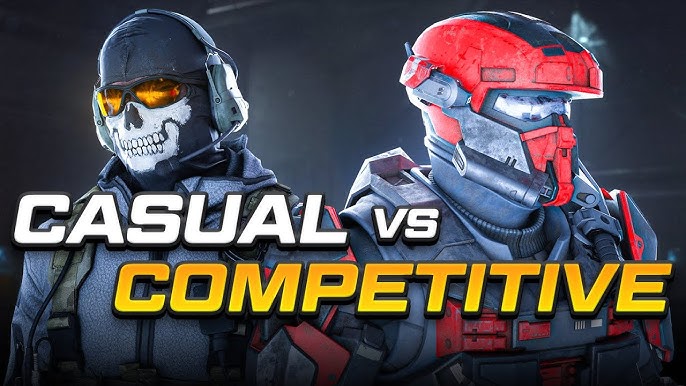From Casual to Competitive: How to Take Your Gaming to the Next Level
Gaming is more than just a hobby; for many, it’s a passion and a potential path to competitive success. Whether you’re just starting out or have already spent countless hours honing your skills, moving from casual to competitive gaming can be a thrilling and rewarding journey. “From Casual to Competitive: How to Take Your Gaming to the Next Level” explores strategies, tools, and techniques that can help you elevate your gameplay, increase your ranking, and compete at higher levels.
This guide covers key aspects of the competitive gaming transition, from improving your mechanics and understanding game strategy to fine-tuning your equipment and mindset. We’ll walk through essential training methods, like focused practice sessions, analyzing professional play, and understanding the mental aspect of gaming. Additionally, we’ll cover optimizing your gaming setup to ensure your hardware and accessories support peak performance.
Whether you’re eyeing esports competitions or simply want to crush your friends in ranked matches, this guide will help you get serious about leveling up your gaming skills.

1. Focus on Skill Improvement, Not Just Wins
In competitive gaming, improving your mechanics and understanding the game’s systems are key. Focus on refining your core skills, such as aiming, movement, and reaction time. Games like Overwatch, League of Legends, and Valorant all reward precise execution, so regular practice with purpose (not just playing casually) is crucial.
Tip: Use aim training programs like Kovaak’s FPS Aim Trainer or Aim Lab to sharpen your accuracy. Work on specific drills that address your weakest areas.
2. Learn from the Pros
One of the fastest ways to elevate your play is by watching professional players and tournaments. Analyze their positioning, decision-making, and team coordination. Streaming platforms like Twitch and YouTube are filled with pro gameplay, tutorials, and breakdowns. In games like Dota 2 or Fortnite, watching professionals can give you insights into advanced tactics and strategies that you may not find in beginner guides.
Tip: Follow specific players or teams in your favorite game to gain insight into their strategies and the tools they use.
3. Set Goals and Track Progress
To transition into competitive gaming, you need structure. Set clear goals, such as improving your K/D ratio, increasing your win rate, or climbing to the next rank. Tracking your progress helps you stay focused on areas that need work.
Tip: Use platforms like Tracker.gg or OP.GG to analyze your performance and review statistics from your past matches. This will give you concrete data on where you need to improve.
4. Master Game Strategy and Positioning
Understanding the meta (most effective tactics available) is crucial in competitive play. Games like League of Legends and Rocket League have specific strategies and optimal positioning that can turn the tide of battle. Competitive players know when to push, when to retreat, and how to play with their team to secure victory.
Tip: Spend time learning the map layouts and meta strategies for your game. For example, in Valorant, knowing the best angles for defending or attacking each map can give you a competitive edge.
5. Optimize Your Setup for Performance
Your gaming setup can play a significant role in your performance. A high refresh rate monitor (144Hz or higher), mechanical keyboard, and low-latency mouse can provide a smoother, more responsive experience, giving you an advantage in fast-paced games. Additionally, consider upgrading your internet connection for lower ping, which is essential for competitive gaming.
Tip: Invest in a good-quality gaming mouse with customizable DPI settings, and make sure your graphics card is up to date to avoid lag during crucial moments.
6. Mental Resilience and Focus
Competitive gaming requires a strong mental game. Players often experience frustration, tilt, or burnout, so developing resilience is essential. Practice staying calm under pressure, focusing on your gameplay, and not letting mistakes affect your performance.
Tip: Take breaks to refresh your mind, avoid negative self-talk, and use relaxation techniques like deep breathing or meditation to stay focused during tense moments.
7. Join Competitive Communities or Teams
Being part of a team or community can help you gain valuable experience. Scrims (practice matches), tournaments, and coaching can all help you learn faster and improve your skills.
Tip: Join Discord servers, Reddit communities, or social groups related to your game to find teammates who can help you improve. Playing regularly with others at your skill level will elevate your gameplay.
8. Commit to Consistent Practice
Lastly, like any skill, improvement in gaming requires consistent practice. Casual gaming can be fun, but competitive play demands a more disciplined approach. Set aside regular time each week to focus on different aspects of your gameplay, from mechanics to strategy to communication.
Tip: Commit to a training schedule, and stick to it. For instance, devote some days to mechanical practice and others to strategy or team-based play.
By following these tips, you’ll be on the path to advancing from casual gamer to competitive player. Keep challenging yourself, refine your skills, and stay committed to improvement!



